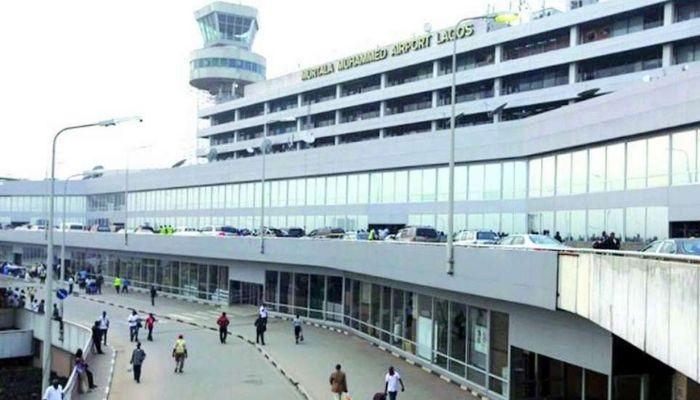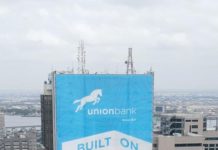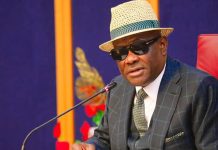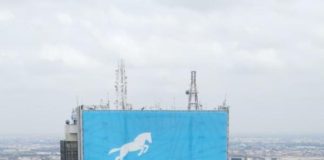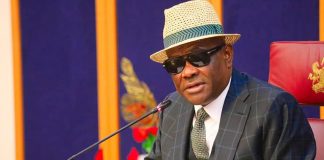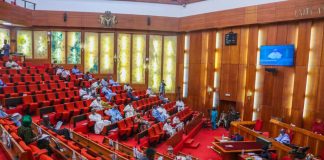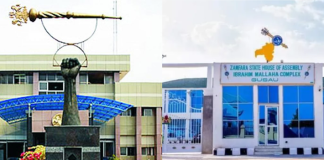🌿 Ruzu Non-Alcoholic Herbal Bitters
Ruzu Non-Alcoholic Herbal Bitters is a natural health supplement specially formulated to:
- ✅ Promote general wellness
- ✅ Detoxify the body
- ✅ Support the treatment of various ailments
Made from a powerful blend of 100% organic and medicinal herbs, Ruzu is completely alcohol-free, making it ideal for:
- 👪 All age groups
- 🌱 Health-conscious individuals
- 🌿 Anyone seeking non-alcoholic herbal remedies
Whether you're looking to boost your vitality, cleanse your system, or support healing the natural way, Ruzu Bitters offers a trusted herbal solution.
According to specialists in the Nigerian aviation sector, the proposed N712 billion refurbishment of the Murtala Muhammed International Airport (MMIA), Terminal One, Lagos, is absurd “at quarter to go.”
It was also disclosed that Nigeria’s airport project might be among the priciest in the world.
In addition, industry experts have recommended that the Federal Government either concession the airport or use public-private partnerships (PPP) instead of spending so much money on airport upgrades when other infrastructure in the nation is falling behind.
Additionally, they assigned the government the responsibility of elucidating the extent of the work and demonstrating greater transparency on the expense.
Last Thursday, in Abuja, the Federal Executive Council (FEC) authorized N712 billion for MMIA’s complete renovation, modernization, and upgrade.
The clearance served as the centerpiece of a comprehensive aviation infrastructure plan worth N900 billion for the nation.
In a press conference, the Minister of Aviation and Aerospace Development, Mr. Festus Keyamo, stated that the project, which was given to the China Civil Engineering Construction Corporation (CCECC), would demolish the old terminal to its structural core and then rebuild it with new plumbing, electrical, and mechanical systems.
Additionally, he stated that the project would be carried out over a 22-month span. We have made the decision to remove everything but the carcass before performing the full mechanical and electrical (M&E) process once more, he stated.
He underlined the administration’s shift from haphazard fixes to a thorough modernization of important aviation infrastructure.
A new apron, access roads, bridges, and other related projects were all approved by the FEC as part of Terminal Two’s development.
The Lagos-related airport project was the most significant single investment in Nigeria’s aviation industry, with a total cost of N712.26 billion when combined with the Terminal One project.
Compared to similar airport development projects in 2024 around the world, the N712 billion—roughly $474.6 million at a N1,500 exchange rate to one dollar—was incredibly high, according to GlobalData’s construction project database.
In the United States (US), for example, Brown Field International Business Park (BFIBP) and the City of San Diego (COSD) are working on the Otay Mesa Metropolitan Airpark, which is only going to cost $1 billion.
On 134 hectares of land, aviation infrastructure and auxiliary non-aviation facilities will be built as part of this project. The project is estimated to generate $500 million in revenue annually for the area and create 4,000 permanent jobs and 8,000 long-term construction jobs when it is finished.
Additionally, a new terminal for Romania’s Henri Coanda International Airport is being built at a cost of $1.04 billion.
At the main airport in Romania, the Bucharest Airports National Company (CNAB) is constructing a new modular passenger terminal that will minimize reliance on the current terminal and accommodate up to 20 million passengers annually.
The proposal include building a new passenger terminal that is 100,000 square meters. The terminal will have four halls, each of which can accommodate up to five million passengers annually. A 650,000m2 aircraft parking platform, 56 additional aircraft parking spaces, 25 boarding gates, 266,000m2 of new taxiways, 9,600 car parking spaces, a 5,000m2 business center, a 200-person hotel, and safety and security systems are also being built.
The expansion of Terminal 2 at Vaclav Havel Airport (PRG) in Prague, Czech Republic, is planned by the Czech Airports Authority (CAA) and is expected to cost $1.19 billion.
The project entails building a new parallel runway, a three-lane access bridge, retail stores, waiting areas, check-in and immigration counters, a cafe and restaurant, and Terminal 2 expansion to accommodate 21.2 million passengers annually.
Along with expanding the aircraft stands, it also entails installing elevators, safety and security systems, a public space in front of the terminal building, and new departure and arrival lounges. Burbank Bob Hope Airport (BBHA), often known as Hollywood Burbank Airport, is investing $1.2 billion to build a 14-gate replacement terminal at BBHA in California.
On 20ha of land, a new airport terminal will be built as part of the project. It entails building a two-story, 32,980-square-meter terminal with 14 airplane gates, access roads, and firefighting and aviation rescue stations.
At Kaohsiung International Airport (KHH) in Taiwan, the Taiwanese Civil Aeronautics Administration (CAA) is investing $1.26 billion to create a new terminal building.
Building a new East Terminal between the current domestic and international terminals is the first phase of the project. Phase 2 entails renovating the current international terminal and building a new West Terminal.
The General Authority of Civil Aviation (GACA) is investing $1.26 billion to develop the Hajj and Umrah Terminals at King Abdulaziz International Airport (JED) in Jeddah, Saudi Arabia.
As part of the project, new arrival halls, a runway, access roads, load centers, utility networks, parking facilities, related facilities, and an automated people mover will be installed.
The airport will be able to handle an extra 15 million passengers annually thanks to the two terminal buildings. Other examples include the $1.3 billion extension of Sacramento International Airport in the United States, the $3.3 billion expansion of Brisbane Airport in Australia, the $4.62 billion modernization of Viracopos International Airport in Brazil, and the $4.8 billion Dallas Fort Worth International Airport Terminal in the United States.
Additionally, aviation specialists advised the government to use PPPs to construct a more effective and sustainable infrastructure development model, which would propel the nation’s economic expansion.
According to Centurion Aviation’s Chief Executive Officer (CEO), Grp. Capt. John Ojikutu, the project’s budget was excessive and a waste of limited resources.
Ojikutu pointed out that none of the renovations were aeronautical and insisted that the government make compromises instead of investing so much money in the project.
In addition to the country’s failure to implement periodic maintenance programs for the majority of aeronautical services, such as runways and taxiways, radar, and navigational aids, among others, he lamented that the majority of the open items found by the International Civil Aviation Organization (ICAO) in 2004 audits had not yet been closed 21 years later.
Furthermore, Ojikutu stated that no non-aeronautical facility could be rehabilitated that could not be concessioned if Bi-Courtney Aviation Services Limited (BASL) was able to build the Murtala Muhammed Airport Two (MMA2), Lagos, from the ground up.
A foreign corporation had bid $30 billion over 30 years for MMIA concessions at N360 billion a year in 2018, he recalled, and he questioned why the Federal Government, led by former Aviation Minister Sen. Hadi Sirika, had not finished the deal. Because these resources are “shared by political officeholders,” Ojikutu also suggested that the government refrain from funding such infrastructure in the nation.
He declared: “It is a waste to spend N712 billion, or $460 million, to renovate a terminal.” Whoever is advocating this waste should provide information if a $500 million Chinese loan may be used for the MMIA Terminal 2 in Abuja, Kano, and Enugu.
What I have observed over the past 20 years in Nigeria’s aviation growth is the needless expenditures made in the final quarter.
The terminal development should be put up for concession so that our agencies’ administrators can start making plans for building security walls in accordance with Annex 17 and airport perimeter fences in accordance with Annex 14 of the ICAO.
Also, aviation expert Capt. Mohammed Badamasi concurred with the government that the interior of the terminal building needed to be renovated, but he noted that a significant sum of money had been allocated for it.
He said that the majority of the allocated funds will be taken out of the taxpayer’s account.
Like Ojikutu, Badamasi advocated for concessions at the terminal and other airports throughout the nation. The restrooms, air conditioning system, conveyor belts, floor tiles, and fingers need to be fixed until a concessionaire is available to take over from the government, he continued.
For complete repair work alone, the N712 billion is excessive. Is $474 million, the equivalent in dollars, likewise too little if N712 billion seems too little?
This amounts to around half a billion dollars. Merchant Express Cargo Airlines CEO Capt. Samuel Caulcrick recommended the government to use the PPP system instead.
He said that the PPP will improve the airport’s impact while simultaneously modernizing its infrastructure. He made the case that the government could improve infrastructure management and upkeep by collaborating with the private sector and benefiting from their resources, efficiency, and experience.
With the private sector having a stake in producing top-notch outcomes, Badamasi emphasized that the private funding infusion could be turned into performance bonds to guarantee that the enhanced infrastructure was handled efficiently.
He asserted, however, that even while the specifics of the N712 billion projects were still being worked out, travelers and those planning to travel should have a smooth journey that incorporates a variety of transportation options, including as air-conditioned buses and light trains, inside the airport setting. “Whatever is decided as the private sector’s performance bond injected funds, the government may reallocate the consortium’s deposited resources to other important sectors of the economy, maximizing the impact of its investments,” he continued.
Read Also: West African Stakeholders Convene in Lagos to Fast-Track Regional Industrialization
“The government will be guaranteed by the performance bonds, which will reduce the risks related to infrastructure management.”
Additionally, the vice president of the Aviation Safety Round Table Initiative (ASRTI), Alex Nwuba, stated that any terminal enhancement would enhance the flying experience, but he questioned the expense. However, Nwuba urged the government to release its formula.
After many years of patching, the minister discussed a substantial demolition of the old terminal since it was a better long-term investment. It is crucial that he further elucidate the extent of the job,” he stated.
The N712 billion airport renovation is a glaring example of the government’s wickedness against the populace – LP
The recent announcement by Minister of Aviation and Aerospace Development Festus Keyamo that the Federal Government plans to spend an astounding N712 billion ($475 million) on the renovation of the Murtala Muhammed International Airport in Lagos has been characterized by the Labour Party (LP) as an indication of government malfeasance against the people.
According to a statement released by LP on Monday, the “outrageous, insensitive” proposal is extremely concerning, particularly given that the National Bureau of Statistics estimates that 133 million Nigerians, or 63% of the country’s population, are multidimensionally poor.
The party declared that the APC-led government is putting luxury ahead of the well-being of the populace, calling this “not just wicked; it is satanic and speaks to a gross disregard for the plight of the masses.”
It also criticized what it saw as the government’s lack of compassion in using the money saved from the elimination of the petroleum subsidy to support the lifestyles of the wealthy rather than raising the standard of living for other Nigerians.
The party’s interim national chairman, Senator Nenadi Usman, received a statement signed by Senior Special Adviser for Media Ken Asogwa, which stated: “To take this lifeline away from the poor and use the money to build a luxury terminal that is only available to the wealthy is a new low in governmental wickedness.”
“Any semblance of empathy or good administration has been totally abandoned by the APC government. Why a project of this kind, which has obvious financial potential, could not be carried out under a public-private partnership (PPP) model is a mystery.
He said, “What is even more shocking is the minister’s revelation that the so-called Renewed Hope Infrastructure Development Fund, which will be used to fund this project, is composed of savings from the elimination of fuel subsidies, which were the only significant advantage that the typical Nigerian had from our God-given fossil fuel resources.”
“Transportation buildings are revenue-generating investments around the world,” the statement added. Instead than wasting subsidy savings on a project that serves only a small portion of the population, why not invite private capital, particularly when the return on investment is self-sustaining? Let’s ask: how many Nigerians who were denied the benefits of the subsidy era still travel by air today? Given that fundamental necessities like food, healthcare, and transportation are now considered luxury items, what use do they have for airport terminals? Asogwa claimed that the administration’s well-documented budgetary irresponsibility does not surprise the LP.
He went on to criticize the Lagos-Calabar coastal highway grant, calling it “a white elephant project estimated at N15 trillion (about $12 billion), costing taxpayers an outrageous N4 billion per kilometer.”
This administration is blatantly characterized by misaligned priorities. Our research in Europe, Asia, and Africa shows multiple examples of modern, cutting-edge airports built from the ground up for significantly less than $475 million.
Therefore, how can this government defend squandering so much public money on a simple renovation? “We really wonder what will shock the conscience of Nigerians if this doesn’t,” he remarked.

